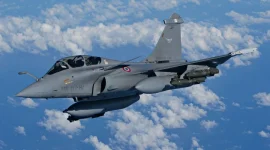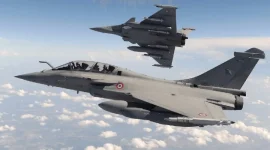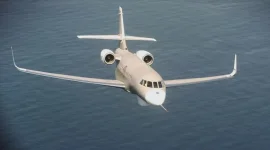- Views: 3K
- Replies: 8
In a significant advancement for India's indigenous defence manufacturing capabilities, French aerospace leader Dassault Aviation has confirmed plans to establish facilities in India for producing Rafale fighter jet fuselages.
Alongside this, the company will set up comprehensive Maintenance, Repair, and Overhaul (MRO) centres dedicated to the aircraft's engines, advanced sensors, and weapon systems.
This major development was formalised under a €7 billion agreement signed on April 28, 2025, for the acquisition of 26 Rafale-Marine fighter aircraft for the Indian Navy.
The initiative is seen as a substantial boost to the Indian government's "Make in India" programme, aimed at fostering self-reliance in the defence sector.
This strategic move is set to deepen defence cooperation between India and France. Furthermore, it positions India as a prospective key centre for both the production and upkeep of Rafale aircraft, which could have notable effects on regional security dynamics and the international defence industry.
The Inter-Governmental Agreement (IGA), finalised between the Indian and French governments on April 28, 2025, outlines the purchase of 22 single-seater and four twin-seater Rafale-Marine jets. These aircraft are intended for deployment on India's aircraft carrier, the INS Vikrant. Deliveries of these naval fighters are scheduled to commence in 2028, with completion expected by 2030.
The agreement also includes provisions for crew training, which will take place in both India and France. Valued at approximately €7 billion, the comprehensive package encompasses simulators, related equipment, weaponry, and a five-year Performance-Based Logistics (PBL) support plan.
A critical component of this deal is the inclusion of Transfer of Technology (ToT) clauses, which pave the way for setting up the fuselage production line and MRO infrastructure within India. Such ToT is vital for developing an indigenous industrial base and reducing long-term dependency on foreign suppliers.
This new procurement aligns with India's wider defence strategy and existing air power assets. The Indian Air Force (IAF) currently operates 36 Rafale aircraft, which were integrated into service between 2020 and 2022. The addition of the Navy's 26 Rafale-Marine versions will increase India's total Rafale fleet to 62 aircraft by the year 2030.
There is also ongoing discussion regarding further orders, notably a potential contract for 114 Multi-Role Fighter Aircraft (MRFA). Should this MRFA deal be finalised with Dassault, India could potentially operate one of the largest fleets of Rafale jets worldwide, possibly exceeding France's own inventory of 231 aircraft.
Fuselage Production Facility to Boost Local Manufacturing
The planned facility for manufacturing Rafale fuselages, a primary structural element of the fighter jet, is anticipated to be situated in Noida or near the Jewar International Airport in Uttar Pradesh.This development signifies a considerable advancement for India, moving beyond simple assembly operations to undertaking core manufacturing of critical aircraft components. This will enable India to become an integral part of the Rafale's global supply network.
The establishment of this facility is consistent with Dassault Aviation's strategy to localise production to support India’s long-term requirements for twin-engine multi-role combat aircraft, especially in light of the upcoming MRFA programme, which aims to acquire 114 new jets over the next two decades.
This will also likely lead to job creation and skill development in advanced aerospace manufacturing within India.
Comprehensive MRO Hub Planned
The MRO hub, which will operate under the name Dassault Aviation Maintenance Repair and Overhaul India (DAMROI), is slated to be located in Noida. This centre will provide maintenance services for Rafale and Mirage-2000 fighter jets, and potentially Jaguar combat aircraft, which also have French technological connections.The DAMROI facility will be equipped to service critical systems including the Safran M88-4E engines, the RBE2 Active Electronically Scanned Array (AESA) radar, the SPECTRA electronic warfare suite, and a range of armaments such as Meteor air-to-air missiles, SCALP cruise missiles, and AASM precision-guided munitions.
In a related development, a separate MRO facility dedicated to Rafale engines, led by Safran (the engine manufacturer), is planned for Hyderabad and is projected to be operational during 2025.
These MRO facilities are not only intended to service India's Rafale fleet but are also expected to support Indonesia's recently acquired 42 Rafale jets. This positions India as a strategically important regional hub for the maintenance of these advanced fighter aircraft.
The main MRO facility in Noida is expected to commence operations within the next six months. It will be headed by Mr. Posina Venkata Rao, an Indian national who has served as a Dassault representative in India for many years. The workforce will comprise both French and Indian personnel.
Dassault Aviation intends to progressively expand its MRO activities in India by collaborating with the local aeronautical ecosystem, including Micro, Small, and Medium Enterprises (MSMEs). This collaboration aims to nurture local expertise, develop indigenous supply chains, and contribute to the overall growth of India's aerospace and defence industry.



